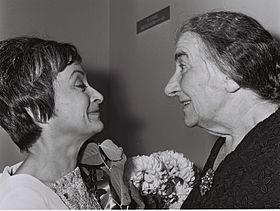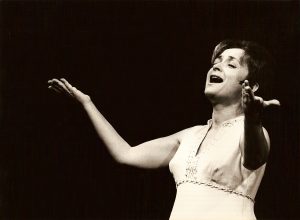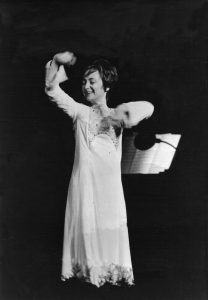A memorial to Nehama Lifshitz
On the 22nd of May, 2017, thirty days after the death of Nehama Lifshitz, the hall at Beit Vilna was packed.
"My heartfelt thanks to Beit Vilna, to the cultural committee, to our family friends and all of you assembled here tonight, 30 days after my mother passed away. We were all together – just as my mother always wanted….my love for you is endless." –Rosa Litai, Nehama Lifshitz' daughter said.
In October, 2017, the Tel Aviv-Jaffa Municipality, hosted an evening to celebrate the 90th birthday of Nehama Lifshitz, of blessed memory, at the Einav Cultural Center. Nehama, an honoree of the city of Tel Aviv, the Lithuanian-Israeli vocalist who sang in Hebrew and Yiddish became a symbol of the 'Jews of Silence' because she was refused permission to make aliyah to Israel.
Dr. Michael Lukin on Nehama / Oneg Shabbat blogspot.
"Thirty days ago, on Friday, the 21st of April, 2017 Nehama Lifshitz passed away at the age of ninety. Nehama, a legendary vocalist and a heroine of Yiddish culture in the second half of the 20th century; in the eyes of hundreds of thousands of Jews from behind the Iron Curtain and across the globe, she was the symbol of the renaissance of the 'the Jews of Silence'. I dedicate this article to the work of 'the Jewish nightingale', as she was called, who dared to sing in Yiddish in the U.S.S.R. only a few years after the murderous waves of Anti-Semitism which reached their peak with 'the doctors' trial' and the murder of the greatest writers and poets of Yiddish literature and culture (1952)."
When she was in her thirty's Nehama defined herself as "a tombstone on a grave that does not exist". However, that was not the only reason that thousands of admirers — about half were young people who knew no Yiddish – grabbed tickets right across the U.S.S.R for her shows, packed the halls and the streets around them in an attempt to catch a glimpse of her and even to touch the hem of her coat.
She was slight and short but had a strong, clear voice. Her mission was to revive a culture that the Soviet regime intended to liquidate, through music, and she succeeded. It is no coincidence that Elie Wiesel, after his first visit to the U.S.S.R. in 1965, called her 'the queen of Judaism in the U.S.S.R.' Indeed, her work is infused with nobility: only 'a queen' could master the two languages, Hebrew and Yiddish, with the appropriate gestures that are an integral part of the language and the heritage, as well as the intricacies of classical song music. She completed her studies at the Vilna Academy for Music and after she had appeared as a soloist in several leading operatic roles, gave up a secure operatic career because, as she said," so as not to waste valuable stage time on an aria from Lakmé". She managed to create a personal repertoire, even though she had no sheet music or recordings, with the help of a handful of talented friends, including the lyricists Shaul (Samuel) Sandry, who, after many years of exile in Siberia, was recently released, Lev Pulver and Lev Kogan."... read more





